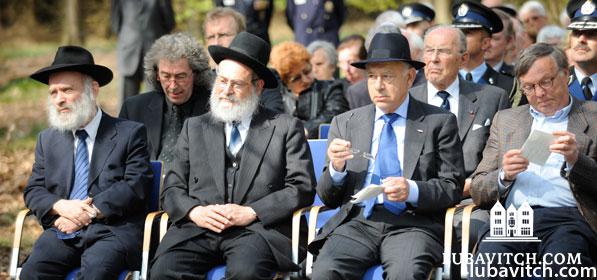(lubavitch.com) On Wednesday April 28, members of the Dutch government apologized to Holland’s Jewish community at the site of the former Westerbork concentration camp.
The apology, for the actions of the Dutch population and government during the Second World War and its aftermath, was made at one of many events held across the Netherlands to mark 65 years since the end of the war. The memorial events led up to Liberation Day on May 5, the anniversary of Dutch liberation from Nazi occupation.
Located in the northeastern Netherlands, Westerbork is widely regarded as a symbol of the suffering and annihilation of Dutch Jewry during the War. The camp was erected in 1939 to absorb the influx of Jews fleeing from the east. In total, 101,000 Dutch Jews and 5,000 German Jews (among them the now famous diarist Anne Frank and her family) were sent to their deaths from Westerbrok, after being deportedto Auschwitz-Birkenau, Sobibór, Bergen-Belsen and Theresienstad.
Although Queen Beatrix of the Netherlands publicly apologized in 1995 for the failure of the Dutch government to aid its 140,000 Jewish citizens during the Holocaust, the government has remained largely silent on Dutch complicity with the Nazis, and the harsh treatment of Jewish refugees who returned after the War.
On April 12, Dr. Ab Klink, Minister of Health, Welfare and Sport, apologized for the country’s failure to help its citizens returning from concentration and DP camps after the war. Jews returning to Holland found that their homes and businesses had been appropriated by their non-Jewish neighbors.
Selma Weinberg, the last remaining Dutch survivor of the Sobibór extermination camp, was at the memorial event. Weinberg, who today resides in the U.S., spoke of the difficulties she faced resettling in her homeland. Returning after the War with her husband, a Polish citizen, the couple found themselves turned away at the border by Dutch authorities.
According to Rabbi Binyomin Jacobs, Chief Rabbi of interprovincial Holland, Chairman of the Dutch Council of Rabbinical Affairs and a Chabad-Lubavitch emissary, the younger generation has begun to question the sanitized image of Dutch aide to its Jewish population during the Holocaust.
“While the majority of Holland’s population did not abet the Nazis, neither did they take action to stop the deportation of their Jewish friends and neighbors,” Jacobs said. “The younger generation wishes to come to terms with the complicity of those who aided in the extermination of Dutch Jewry.”
Jacobs is quick to add that acts of heroism did take place among the Dutch resistance and in the general population. In recent years, a group of non-Jewish volunteers has helped Jacobs tend to the 240 Jewish cemeteries in areas now devoid of Jewish communities. While Jacobs is troubled by a recent spike in anti-semitism in Holland, he feels that interest from the general population has also had a positive affect. “People are now learning about the hundreds of years of Jewish history in the Netherlands. The destruction of Dutch Jewry during the War is no longer something that took place in a foreign land – but rather in their own backyards.”
At the ceremony in Westerbork on April 28, Dick van Putten, the Lieutenant-General of the the Koninklijke Marechaussee or KMar, the Dutch Royal Military Police, addressed the crowd. During the Nazi occupation, members of KMar were incorporated into the German SS and served as the camp’s guards.
“I realize that those policemen [who served under the Germans] were forced by the regime,” van Putten said. “[However] that commitment to serve the occupier should never have happened. I regret this very much.”
Through the KMar’s acknowledgment of its past and its renewed dedication to keeping the memory of those who perished alive, van Putten hopes that the story of those who suffered at Westerbork will be conveyed to future generations.
“Behind each one [of the 102,000 deported from Westerbork for extermination] is a story. And each story is unique. The Royal Military Police draws lessons from the past. We suffer along with the survivors and mourn along with their families. They deserve our attention, compassion, respect and appreciation.”
Among those attending the event was Rabbi Yitzchak Vorst, Director of Chabad-Lubavitch of Holland. A survivor himself, Vorst spent his childhood behind Westerbrok’s walls. Addressing the crowd, he recalled his experience as one of only a handful of children remaining in the camp’s school. Despite his pain and discomfort in returning to the camp, Vorst felt an ironic sense of justice.
“The first time I came back to this place after so many years,” Vorst recalled, “I was struck by the irony that the same police-force that had held me captive as a child was now standing to salute me as a rabbi.”

Be the first to write a comment.